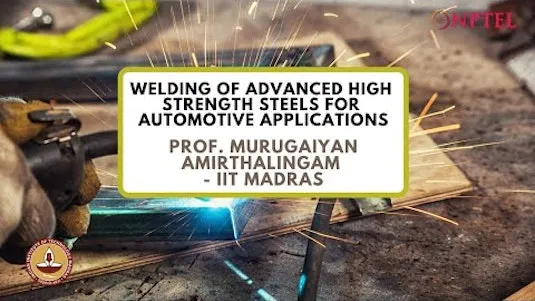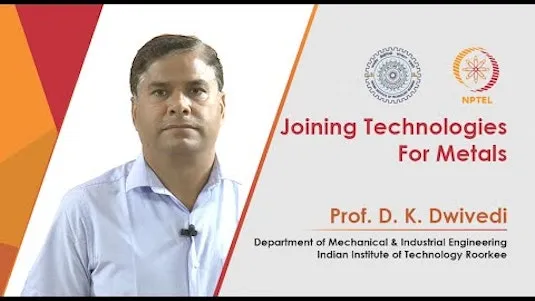
Welding Of Advanced High Strength Steels For Automotive Applications 
This course provides an overview of welding of advanced high strength steels (AHSS) for automotive applications. It covers the role of alloying elements in stabilizing multi-phase microstructures of AHSS, the effect of weld thermal cycles on the evolution of microstructures, and the weldability of AHSS. It is intended for final year bachelors and masters students in Metallurgy, Mechanical, Automobile and Production Engineering, as well as industrial personnel working in automotive and steel making industries. Prerequisites include basic knowledge of steel physical metallurgy and welding processes. Industry support is provided by automotive manufacturers and their OEMs and steel plants. ▼
ADVERTISEMENT
Course Feature
![]() Cost:
Cost:
Free
![]() Provider:
Provider:
Swayam
![]() Certificate:
Certificate:
Paid Certification
![]() Language:
Language:
English
![]() Start Date:
Start Date:
20th Aug, 2023
Course Overview
❗The content presented here is sourced directly from Swayam platform. For comprehensive course details, including enrollment information, simply click on the 'Go to class' link on our website.
Updated in [May 25th, 2023]
This course on Welding of Advanced High Strength Steels for Automotive Applications is designed to provide learners with an in-depth understanding of the role of alloying elements in stabilizing multi-phase microstructures of AHSS, the effect of weld thermal cycles on the evolution of microstructures and the weldability of AHSS. Learners will gain knowledge on the use of advanced high strength steels (AHSS) in automotive applications, and the weldability of AHSS due to the high alloying contents required to obtain multi-phase microstructure. The course is suitable for final year bachelors and masters students in Metallurgy, Mechanical, Automobile and Production Engineering, as well as industrial personnel working in automotive and steel making industries. Prerequisites include a basic knowledge of steel physical metallurgy and welding processes. The course is supported by all automotive manufacturers and their OEMs and Steel plants.
[Applications]
The application of this course can be seen in the automotive and steel making industries. It can help industrial personnel to understand the role of alloying elements in stabilizing multi-phase microstructures of AHSS, the effect of weld thermal cycles on the evolution of microstructures and the weldability of AHSS. It can also help final year bachelors and masters students in Metallurgy, Mechanical, Automobile and Production Engineering to gain a better understanding of the welding of advanced high strength steels for automotive applications.
[Career Paths]
1. Automotive Engineer: Automotive engineers are responsible for designing, developing, and testing vehicles and their components. They must have a strong understanding of the latest technologies and trends in the automotive industry, as well as the ability to work with a variety of materials and components. Automotive engineers are in high demand as the industry continues to grow and evolve.
2. Welding Engineer: Welding engineers are responsible for designing and developing welding processes and procedures for a variety of applications. They must have a strong understanding of welding techniques and materials, as well as the ability to troubleshoot and solve welding-related problems. With the increasing use of advanced high strength steels in automotive applications, welding engineers are in high demand to ensure the safe and efficient welding of these materials.
3. Automotive Design Engineer: Automotive design engineers are responsible for designing and developing the exterior and interior of vehicles. They must have a strong understanding of the latest trends in the automotive industry, as well as the ability to work with a variety of materials and components. Automotive design engineers are in high demand as the industry continues to grow and evolve.
4. Automotive Quality Engineer: Automotive quality engineers are responsible for ensuring that vehicles meet the highest standards of quality and safety. They must have a strong understanding of the latest technologies and trends in the automotive industry, as well as the ability to troubleshoot and solve quality-related problems. With the increasing use of advanced high strength steels in automotive applications, automotive quality engineers are in high demand to ensure the safe and efficient use of these materials.
[Education Paths]
1. Bachelor of Science in Metallurgy: This degree program focuses on the study of metals and their properties, as well as the processes used to create and shape them. Students learn about the physical and chemical properties of metals, the principles of metallurgy, and the techniques used to form and shape metals. This degree is becoming increasingly important as the automotive industry continues to rely on advanced high strength steels for its products. Developing trends in this field include the use of new technologies such as additive manufacturing and 3D printing to create complex metal components.
2. Bachelor of Science in Mechanical Engineering: This degree program focuses on the design, development, and operation of mechanical systems. Students learn about the principles of engineering, thermodynamics, and fluid mechanics, as well as the design and analysis of mechanical components. This degree is becoming increasingly important as the automotive industry continues to rely on advanced high strength steels for its products. Developing trends in this field include the use of new technologies such as computer-aided design (CAD) and computer-aided manufacturing (CAM) to create complex mechanical components.
3. Bachelor of Science in Automotive Engineering: This degree program focuses on the design, development, and operation of automotive systems. Students learn about the principles of engineering, thermodynamics, and fluid mechanics, as well as the design and analysis of automotive components. This degree is becoming increasingly important as the automotive industry continues to rely on advanced high strength steels for its products. Developing trends in this field include the use of new technologies such as computer-aided design (CAD) and computer-aided manufacturing (CAM) to create complex automotive components.
4. Bachelor of Science in Production Engineering: This degree program focuses on the design, development, and operation of production systems. Students learn about the principles of engineering, thermodynamics, and fluid mechanics, as well as the design and analysis of production components. This degree is becoming increasingly important as the automotive industry continues to rely on advanced high strength steels for its products. Developing trends in this field include the use of new technologies such as computer-aided design (CAD) and computer-aided manufacturing (CAM) to create complex production components.
Course Provider

Provider Swayam's Stats at AZClass
Discussion and Reviews
0.0 (Based on 0 reviews)
Explore Similar Online Courses

Whimsical Faces: Drawing Basics

Learn Mexican Spanish with Video and Pictures

Python for Informatics: Exploring Information

Social Network Analysis

Introduction to Systematic Review and Meta-Analysis

The Analytics Edge

DCO042 - Python For Informatics

Causal Diagrams: Draw Your Assumptions Before Your Conclusions

Whole genome sequencing of bacterial genomes - tools and applications

Welding Safety

Fundamental of Welding Science and Technology

Joining Technologies For Metals
 Related Categories
Related Categories
 Popular Providers
Popular Providers
Quiz
 Submitted Sucessfully
Submitted Sucessfully
1. What is the intended audience for this course?
2. What is the prerequisite for this course?
3. What is the main purpose of this course?


Start your review of Welding Of Advanced High Strength Steels For Automotive Applications